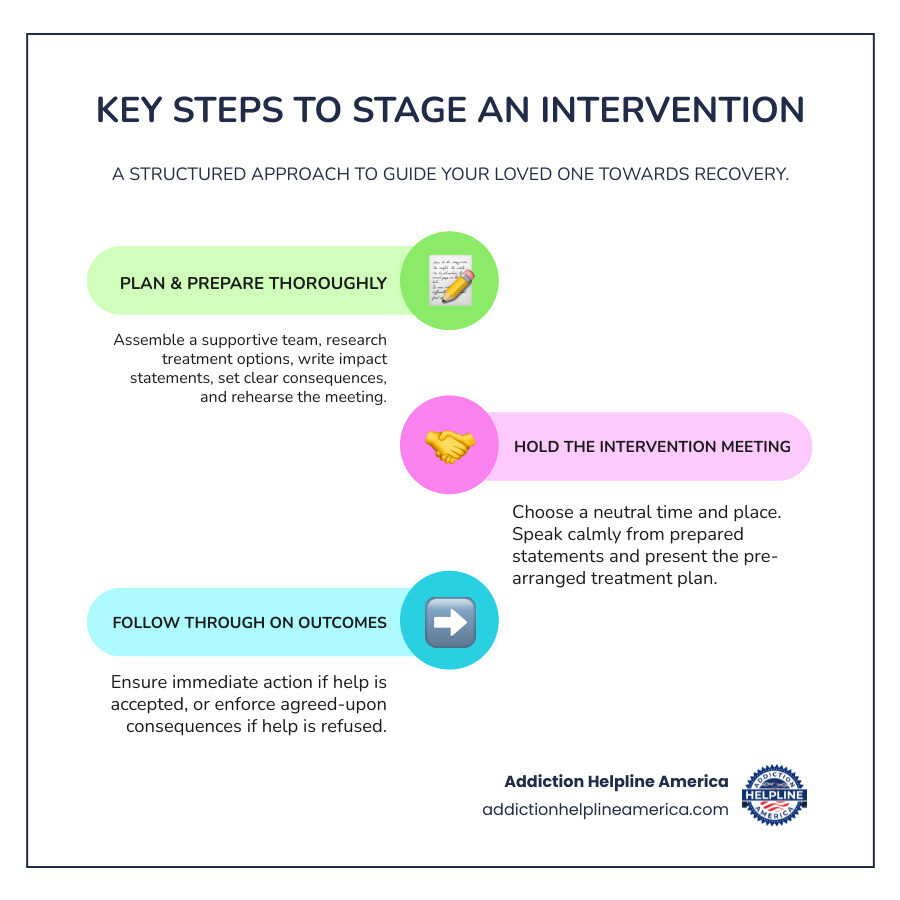
When Love Demands Action: Understanding Intervention
How to stage intervention effectively requires careful planning, a supportive team, and a structured approach. Here’s what you need to know:
Key Steps to Stage an Intervention:
- Assemble your team – Gather 4-6 close family members or friends who care about the person
- Hire a professional interventionist – Especially if violence, mental illness, or past treatment failures are present
- Research treatment options – Pre-arrange admission to a specific program before the meeting
- Write impact statements – Use “I” statements to express how the addiction has affected you
- Set clear consequences – Decide what boundaries you’ll enforce if help is refused
- Rehearse the meeting – Practice what everyone will say and anticipate reactions
- Choose the right time and place – Pick a neutral, private location when they’re likely to be sober
- Hold the intervention – Speak calmly from prepared statements and present the treatment plan
- Follow through – Take immediate action if they accept, or enforce consequences if they refuse
Watching a loved one struggle with addiction is painful. You may have pleaded or argued with them, but addiction is a disease that often prevents people from seeing their desperate need for help.
An intervention is a structured process where loved ones help someone recognize their addiction and accept treatment. It’s not about blame; it’s an act of love, honesty, and support. When guided by a professional, interventions can be up to 90% successful in convincing someone to seek help.
The process requires gathering the right people, researching treatment, writing what you’ll say, and being ready to enforce consequences if help is refused. The approach must be compassionate, not confrontational.
At Addiction Helpline America, our specialists have guided countless families through how to stage intervention meetings that lead to lasting change. We’ve seen how a well-planned intervention can be the turning point that saves a life.
Understanding and Planning the Intervention
Before diving into how to stage intervention meetings, it’s important to understand why this step is necessary.
Addiction is a disease, not a moral failing. It changes brain function related to decision-making and impulse control, which is why a loved one might act against their own values. Denial is a major barrier to getting help, and when one-on-one conversations repeatedly fail, a formal intervention becomes necessary.
It’s time to intervene when you see signs like worsening harm to themselves or others, a consistent pattern of ignoring concerns, or a complete unwillingness to consider treatment. Other red flags include secretiveness, neglected responsibilities, and significant changes in personality or appearance. You don’t have to wait for “rock bottom”; interventions can work at any stage, and earlier is often better.
With careful planning, especially with a professional, success rates can reach as high as 90%, with about 85% of people choosing to seek treatment after a well-conducted intervention.
Assembling the Intervention Team
The right team is crucial. Select 4 to 6 people your loved one respects, such as close family members or trusted friends. The goal is to show a united front of love and concern.
It’s just as important to know who to exclude. Don’t include anyone your loved one dislikes, anyone with their own unmanaged substance use or mental health issues, or anyone who can’t remain calm under pressure. Appoint one person as a team leader to coordinate planning and keep communication flowing.
The Role of a Professional Interventionist
Hiring a professional interventionist dramatically increases your chances of success. We strongly recommend a professional if your loved one has a history of violence, severe mental illness, has discussed suicide, or is dealing with polysubstance abuse. An interventionist is an objective third party trained to manage high emotions and guide the process from planning to follow-up.
To find the right fit, ask for referrals from doctors or therapists, or search the Association of Intervention Specialists. When interviewing candidates, ask these key questions:
- What is your experience and what intervention models do you use?
- How do you prepare families and handle resistance?
- What are your fees and what do they cover?
- What support do you provide after the intervention?
- Can you provide references from past clients?
Researching Treatment and Setting Goals
Before the intervention, you must do your homework so you can act immediately if your loved one agrees to help.
First, research the specific addiction to understand its effects. This knowledge helps you counter denial with facts. Next, identify and compare treatment options. The spectrum of care is wide, and our guide on Drug Rehab: Inpatient vs Outpatient can help you understand the differences. Have multiple options ready.
A critical step is to pre-arrange admission to a facility. Motivation is fleeting, so you must be able to act within hours. Contact national organizations or your insurance provider to research programs, but be wary of any promising quick fixes.
Finally, set a clear, specific goal for the intervention, such as, “We want them to agree to enter the inpatient facility we’ve arranged by tomorrow morning.” Everyone on the team must agree on this goal to ensure you’re all working toward the same outcome.
Addiction Helpline America can help you with this research and planning phase, connecting you with treatment programs that match your loved one’s needs.
A Step-by-Step Guide on How to Stage an Intervention
You’ve assembled your team and researched treatment. Now it’s time to put your plan into action. The key to how to stage intervention successfully lies in careful preparation and a structured meeting.
Planning and Preparation: The Foundation of How to Stage an Intervention
Solid preparation is the foundation for a successful intervention.
First, choose the right time and place. Select a private, neutral location where your loved one feels safe. Plan the meeting for a time when they are most likely to be sober, such as early in the morning.
Next, each team member must write an impact statement. These are personal letters, not lectures. Use “I” statements to express how the addiction has affected you personally (e.g., “I felt scared when you didn’t come home”) instead of accusatory “you” statements. Focus on specific events and maintain a loving, compassionate tone.
While writing these letters, you also need to establish consequences. Each person must decide on a specific, enforceable boundary they will implement if treatment is refused (e.g., no longer providing financial support). These consequences must be realistic, and you must be prepared to follow through. This is about stopping enabling behaviors, not punishment.
Finally, rehearse the intervention. As a team, practice reading your statements, decide on a speaking order, and anticipate potential reactions like anger or denial. Rehearsal helps everyone stay calm, focused, and unified.
The Meeting Itself: Key Steps in How to Stage an Intervention
On the day of the intervention, take a deep breath and remember you are acting out of love.
Getting the person there often works best with a simple, non-alarming invitation, as they might refuse to come if they know an intervention is planned. Something like, “Can you come over for a family meeting?” is usually effective.
Once gathered, the team leader or interventionist delivers the opening statements, setting a warm but direct tone: “We’ve asked you here today because we love you and we’re worried. We want to talk about your addiction and how we can help.”
Then, one by one, each team member calmly reads their impact statements. This collective testimony of pain and worry can often break through the wall of denial in a way individual conversations cannot.
After everyone has spoken, present the treatment plan. Be specific: “We’ve found a program at [facility name] that specializes in [their specific addiction]. They have a bed available for you today, and we’re ready to take you there right now.” This shows you are serious and that a clear path forward is available.
Finally, it’s time for asking for a decision. Directly ask them to accept the help you’re offering: “We’re asking you to go to treatment today. Will you do that?”
After the Intervention: Navigating Outcomes and Next Steps
The intervention meeting is the beginning, not the end. Your family’s response in the following hours and days is critical, regardless of the outcome.
If They Accept Help
If your loved one agrees to get help, you must act immediately while their motivation is strong. Have their bags packed and take them to the pre-arranged treatment center right away—ideally within hours.
Your involvement doesn’t end there. Participate in family therapy sessions offered by the treatment program to heal together and learn healthier communication. Consider joining support groups like Al-Anon or Nar-Anon to connect with other families who understand your experience.
Ongoing support is vital for long-term recovery. Maintain healthy communication and help your loved one create a solid aftercare plan. You can review our Relapse Prevention Tips to better understand how to support their journey. Recovery isn’t a straight line, and your consistent, loving presence makes a difference.
If They Refuse Help
It’s painful if your loved one says no, but it doesn’t mean the intervention failed. Your response is key.
Stay calm and do not argue or plead. Resistance and denial are natural reactions. Calmly reiterate that your actions come from a place of love.
Then comes the hardest part: enforcing consequences. Every team member must follow through on the boundaries they set. This isn’t about being cruel; it’s about protecting yourself and showing your loved one you are serious. Upholding consequences means stopping enabling behaviors, like providing money or making excuses, which only prolongs the addiction.
It’s painful to watch, but it creates an environment where change becomes possible. Let your loved one know the door for help remains open when they are ready. It often takes more than one intervention.
Finally, prioritize family self-care. Supporting someone with addiction is emotionally exhausting. Seek your own counseling or join a support group. Taking care of yourself is essential and puts you in a better position to help when your loved one is finally ready.
At Addiction Helpline America, we understand that how to stage intervention extends far beyond the meeting. We’re here to support families through every phase of this journey.
Frequently Asked Questions about Staging an Intervention
This section addresses common queries to provide further clarity and help you prepare for the complexities of an intervention.
What are common intervention strategies and models?
When learning how to stage intervention, it helps to know there are different approaches. A professional will guide you, but here are three common models:
The Johnson Model is a surprise-style, direct confrontation. The family gathers without the person’s knowledge to share how the addiction has caused harm, aiming to break through denial. As detailed by the American Psychological Association, it requires thorough preparation.
The ARISE Model is an invitational, less confrontational method. The person struggling with addiction is invited to participate in planning their own intervention, which can build motivation through collaboration.
The Family Systemic Model views the entire family as the “patient.” It addresses unhealthy family dynamics and communication patterns that may have enabled the addiction, often through ongoing family therapy.
| Model | Approach | Family Involvement | Preparation |
|---|---|---|---|
| Johnson Model | Surprise-style, direct confrontation | Family prepares statements, person not involved in planning | Extensive rehearsal, pre-arranged treatment |
| ARISE Model | Invitational, less confrontational | Person and family both involved from beginning | Collaborative planning with loved one |
| Family Systemic Model | Focuses on entire family system | Whole family as “patient,” ongoing therapy | Addresses family dynamics and patterns |
A professional can help you determine which approach is best for your situation.
Why do some interventions fail?
Not all interventions succeed immediately. Understanding common pitfalls can increase your chances of success.
- Poor planning: Spur-of-the-moment interventions without research, rehearsal, or clear goals rarely work.
- Including the wrong people: Individuals the person dislikes or who can’t control their emotions can derail the meeting.
- Allowing emotions to take over: If the meeting becomes an angry, accusatory argument, the message of love is lost.
- Not hiring a professional when needed: Complex cases involving violence or severe mental illness require expert guidance.
- Failing to follow through on consequences: Empty threats undermine the intervention’s seriousness and enable the addiction to continue.
A poorly planned meeting can worsen the situation, as noted by Mayo Clinic research, by damaging relationships and making the person less willing to consider future help.
Can you force someone into treatment?
In most cases, you cannot legally force an adult into treatment against their will. Voluntary treatment generally leads to better long-term outcomes.
However, some states have involuntary commitment laws, typically for cases where a person poses an immediate danger to themselves or others. The effectiveness of forced treatment is mixed.
The goal of an intervention is to motivate, not coerce. By showing the reality of the situation, offering a clear path to help, and setting firm boundaries, an intervention creates circumstances that encourage a person to choose recovery for themselves. Even a reluctant “yes” can be the first step toward genuine change once they are in a supportive treatment environment.
At Addiction Helpline America, we believe in empowering people to choose recovery. Our goal is to help you create an intervention that makes the choice for treatment the clear and attractive option.
Our helpline is 100%
free & confidential
If you or someone you care about is struggling with drug or alcohol addiction, we can help you explore your recovery options. Don’t face this challenge alone—seek support from us.
Programs
Resources
Will my insurance
cover addiction
treatment?
We're ready to help
Find the best
drug or alcohol treatment
center
Are you or a loved one struggling with addiction? Call today to speak to a treatment expert.
















